- Home
- André Aciman
Harvard Square Page 2
Harvard Square Read online
Page 2
This was a different Cambridge.
As happened every year once its students and most of its faculty were gone by midsummer, Cambridge began to acquire a different, gentler, working-class character. The pace slackened; the barber would stand outside his shop to smoke a cigarette, salesclerks at the Coop would be chatting it up among themselves, the waitress at Café Anyochka would still not have made up her mind whether to leave the glass door open or if it was time to turn on their rickety air conditioner. Cambridge in early August.
I was staying the whole summer, holding a very part-time summer job in one of the Harvard libraries. The job paid a puny sum per hour. To make ends meet I tutored French. Money went toward rent. Other priorities were: food, cigarettes, a drink whenever possible. When money ran out, which it inevitably did by the end of each month, I’d put on a shirt, a jacket, and a tie and have lunch at the faculty club, where, amidst the established Harvard faculty and visiting dignitaries, I would eat on credit. I had failed my comprehensive exams in January, which left me just one more chance to retake them. I was reading books for my second try, scheduled for early in the new year, always lugging books wherever I went. Inside me I had the sinking feeling that graduate school would wear on and on with no end in sight till, before I knew it, I’d turn thirty, then forty, then die. Either this, or I’d flunk my comprehensives again, and they’d find out what they probably suspected all along: that I was a fraud, that I was never cut out to be a teacher, much less a scholar, that I had been a bad investment from the get-go, that I was the black sheep, the rotten apple, the bad seed, that I’d be known as the impostor who’d hustled his way into Harvard and was let go in the nick of time. All I’d been doing these past four years was hide from the merciless world outside the academy, burying myself in books all the while resenting the very walls that sheltered me and made it possible for me to read more books. I hated almost every member of my department, from the chairman down to the secretary, including my fellow graduate students, hated their mannered pieties, their monastic devotion to their budding profession, their smarmy, patrician airs dressed down to look a touch grungy. I scorned them because I didn’t want to be like them, but I didn’t want to be like them because I knew that part of me couldn’t, while another wanted nothing more than to be cut from the same cloth.
When I was not working at the library, I would go upstairs on the roof terrace of my building to sunbathe—with my folding chair, my bathing suit, my cigarettes, my books, and an endless string of watered-down Tom Collins which I dutifully replenished every two hours or so in my apartment, situated right under the terrace. I had taken the magnum bottle of Beefeater gin at the end of a departmental party in late spring; the bottle had a long way to go yet. I liked to read while listening to music. Often a couple sat next to me, reading and drinking as well. One of them, in a bikini, liked to chat every once in a while. She introduced me to John Fowles. I introduced her to Tom Collins. Sometimes she brought cookies or sliced fruit. On that terrace above the fourth floor overlooking Cambridge, all I had to do was stare at my book, smell the suntan lotion around me, and, in the silence of a weekday morning right there on Concord Avenue, drift away and think I was finally lying by some beach on the Mediterranean, or my long-lost Alexandria which I knew I would never again set eyes on except in sleep.
Sometimes I would offer to fill an iced drink on my next trip downstairs for another neighbor who like me was also reading for her orals. She’d accept, and for a few seconds we would talk. I loved her glistening tan shoulders and slim, bare feet. But before I was able to have a conversation with her, she’d be back to reading. Was my music too loud? No, it was fine. Sure it wasn’t bothering her? It didn’t. Apartment 42 was clearly not interested. Apartment 21, who also came up to sunbathe sometimes, was a bit more talkative, but she lived with her twin sister, and there were times when I could hear them go at each other, some of the vilest insults I’ve ever heard flung between two humans. Better stay away—though the idea of twin sisters in the same bed at the same time never failed to arouse me. Apartment 43, who lived next door to me, already had a boyfriend, which explained why she was so seemingly forthcoming. Like me, they were both in their mid-twenties. In the morning, they would leave the building together, the spitting portrait of the world’s healthiest relationship. She’d accompany him to the Square, where he’d catch the train to Boston and she’d turn around with their collie and come back by way of the Cambridge Common. We shared the same service landing, their kitchen door facing mine. They liked pancakes in the morning. Sometimes, the smell of their breakfast wafted into my kitchen, especially when I opened my service door and they left theirs open for cross-ventilation, which is when I’d catch them in boxers and pajamas. On weekends they cooked French toast and bacon. I loved the smell. It stood for family, hearth, friendship, domestic bliss. People who cooked French toast lived with people, liked people, understood why people needed people. In three years, tops, they’d have children. On Saturdays sometimes he would head off to work. Later she’d come upstairs on the terrace in her bikini, eager to make small talk, carrying a towel, suntan lotion, and always something by a British author. Did she know I could hear her passionate cries at night? I was sure she knew.
When she stepped onto the roof terrace on Sunday mornings carrying her folding chair, she’d beam a smile at whomever was lounging there, amused, sly, and self-conscious. She wanted me to know she knew I knew. But it stopped there. When I would take a break and offer to bring her a Tom Collins, she’d decline with a smile—as always amused, sly, and self-conscious. She knew what I was thinking.
On weekday mornings, I loved to look down from my window and watch them leave. Their life was perfectly rounded. Mine had transcendental homelessness written all over it. They headed out and came back, while I stayed put, getting progressively more tanned, more bored. There was nothing to do but read all day. I was not teaching, barely tutoring; I was not writing; I didn’t even own a TV. I would have loved to drive out somewhere. But no one I knew had a car. Cambridge was a fenced-in, isolated strip of parched land.
Upstairs, on the terrace, is where I had decided to reread in the space of six months everything I needed for my comprehensive exams on seventeenth-century literature. Mid-January was far off yet, but in the middle of the night it felt like minutes away. Every time I was done reading a book, I’d discover many more I needed to read or reread. I’d budgeted two books a day. When it came to French prose writers I’d read three a day. The Elizabethan, Jacobean, and Restoration prose writers, definitely two a day. But then came the picaresque writers of Spain, and the prose writers of Italy, one adulterous tale after the other until the whole history of European fiction seemed written by P. G. Wodehouse on steroids. And finally German and Dutch authors. Here the solution was very simple: if I hadn’t already read them, they were never written. Ditto with some of the great French gossipmongers of the royal court: if I couldn’t remember them, they were not important. Meanwhile, I’d reread The Letters of a Portuguese Nun and Don Carlos many times and was still awed by their brilliance, which gave me hope. I was slashing my way through a jungle of books, constantly finding clever ways to assuage the pangs of conscience each time I realized I’d omitted an important work. Not exactly scholarship—but under the blazing summer sun and the near-hypnotic scent of suntan lotion around me as I watched so many thighs lounging about on tar beach, no one could ask for more.
My dissertation advisor, Professor Lloyd-Greville the redoubtable seventeenth-century scholar, had admitted me into the department with high hopes. He had always tried to throw a few financial-aid dollars my way, and he had once expected me to pass my comprehensives with cutlass and steed, like the caliph Haroun al-Rashid jumping over impossible human hurdles. He always brought up Haroun in my company, either because Haroun, like me, came from the Middle East, or because, in addition to being a great soldier and statesman, Haroun was also a patron of the arts and sciences, all of which Lloyd-Greville aspired
to. But I couldn’t begin to know what he thought of me or of Haroun. Born, bred, and blooded at Harvard, Lloyd-Greville was a paragon scholar who also happened to be an authority on Yeats. I could just picture myself knocking at his door after taking my exams a second time and hearing him say, with his courtly smile followed by that unmistakable little cough that cleared his throat before he’d utter one of his lapidary pronouncements, that this time, he was so very sorry to say, I’d definitely missed the boat to Byzantium. “Even third-class passage?” I’d ask. “Even third-class passage,” he’d say. “How about the bilge area, there are always ex-convicts and stowaways in bilge class.” “Even bilge class,” he’d declaim, as he’d put on a strained much as we regret to announce smile and screw in the cap of his Montegrappa pen that had just signed my death warrant.
My other advisor, Professor Cherbakoff, was more lenient but would never deign sign off on my exams if Lloyd-Greville demurred. He liked me, I knew, but his paternal concern for me had grown downright oppressive. He too came from a Jewish family that lost everything in France owing to war and politics. His return to France after the war as a student had filled him with such horror that a few years later he was lucky enough to find a position in the United States and put France behind him. His was a sobering reminder that France, the France I dreamed of when there was no other place left to dream of, either had never existed or might never open its doors to me.
Lloyd-Greville, by contrast, worshipped France. He owned a sixteenth-century mansion in Normandy. A legendary leather-framed picture of it, which was always the talk of the department, sat in his office: wife, two daughters, maid, cook, gardener, dog, and two to three de rigueur cows sprawled in the distant fields. “Yes, it is perfect,” he once said when I sat in his office and, to soften him up after staring at the picture, said that his house, his life looked perfect. Cherbakoff would never have had the nerve to agree with me, at least not so readily. He knew exactly what I was going through, knew how self-doubt scrapes down the soul, till all that’s left is a flimsy sheath as thin as a sliver of onion skin. He wanted me to follow in his footsteps, which is also why I avoided him.
Usually by one o’clock on the rooftop, I had enough energy to read for at most an hour or so in my apartment. I liked when it was dark and cooler inside. After that came the small library where I worked and where I’d read some more. Then I’d wander about Harvard Square in search of another place, preferably an indoors café, after which there’d be another place, and maybe another, before I turned in.
RIGHT NOW, BETWEEN me and the elements stood a blow fan at Café Algiers, just as between me and my rudderless summer sat the two volumes of Montaigne’s Essays which I’d been promising Lloyd-Greville to comb through, essay after essay. Pascal I’d promised to reread afterward. As for all the short novels ever penned by Europe’s middlebrow hucksters, I’d just have to do what they themselves claimed they did: wing it.
One could spend an entire day at Café Algiers. It was a tiny, cluttered, semi-underground café off Harvard Square that held no more than a dozen tiny, wobbly tables and that looked like a miniature Kasbah about to spill on the floor. How they managed to stuff so many tiny, rickety tables, chairs, and a giant antique espresso maker, plus a whole kitchen area in one-tenth the space needed was beyond me. The owner must have been an engineer by training who doubled as part-time cook, cashier, waiter, and busboy. They served coffee, juices, sandwiches, and cakes. Weather permitting, Algiers boasted a tiny alfresco area on what could have passed for a terrace but was really no more than a narrow passageway between Brattle Street and the bar Casablanca on the way to Mount Auburn Street. People parked their cars in a lot right behind the bar.
I hadn’t spoken to a soul all weekend. It was Sunday, everything was closed, and I’d been roaming from one coffeehouse to the next. It was now late in the afternoon. Another scorching weekend like this and I’d wilt, no one would miss me, no one would even know. I found myself thinking of the young couple in Apartment 43. They were having people over for dinner, she told me. Gazpacho and lamb chops and God knows what else—wine, always wine. He liked to cook. She liked books. After dinner, they’d wash and dry the dishes in the kitchen, and he’d playfully bump her hips with his, as I watched him do once downstairs when he stood by her while she took forever to empty their mailbox. Had he bumped her ass in jest, or simply to mean Will you hurry? They had two names on their mailbox. Soon they’d have just one.
I was reading Montaigne’s Apologie de Raimond Sebond that afternoon, and was sitting in a relatively quiet corner of Café Algiers drinking an iced coffee that was to last me at least two and a half hours. Nursing a drink is one thing. But watching your ice cubes melt and turn the watered-down brew into clear soup and still pretend that your glass is half full was like trying to preserve the polar icecaps with a paper fan.
Then I heard him. He was sitting at a table not far from mine, speaking French. Correction: he wasn’t speaking. He didn’t speak; instead, he rapid-fired machine-gun style, in bursts and sputters. Rat-tat-tat, he took down civilization, Western and Eastern, no difference, he hated them both. Cranky, jittery, crazed, strafing his way from one subject to the next—it didn’t matter which—he’d mow it down. Rat-tat-tat, like shattered glass spun in a blender. Rat-tat-tat, like a jackhammer, like a chainsaw, like a power drill, every syllable spiked with venom, vengeance, and vitriol.
I had no idea who he was, what exactly he was talking about, or why he kept raising his voice, but in this underground café on a quiet midsummer Sunday afternoon, his was the only voice you heard.
Oui, oui, oui—rat-tat-tat. Bien sûr, bien sûr—rat-tat, rat-tat. Et pourquoi pas?—rat-tat-tat-tat? Long sentences, spoken with spitfire accuracy, while all around him sat cigarettes, napkins, matches, a cheap lighter, home keys, car keys, leftover change from his previous coffee before he’d decided to order a second and then a third—debris strewn helter-skelter about his table like the spat-out bullet shells of his hysterical prattle. Rat-tat-tat, down with capitalists, communists, liberals and conservatives, Old World, New World, the League of Nations, the Arab League, the League of Women Voters, the Catholic League, the Great Wall of China, the Berlin Wall, down with them all! Whites, blacks, men, women, Jews, gays, lesbians, rich, poor, cats, dogs—a flint storm of curses as unmistakably North African French as the cicadas on sleepy Mediterranean afternoons when they drown out every other sound with the raspy musketry of their hindquarters.
At that moment he was fulminating against white Americans, les amerloques, as he called them. Americans loved all things jumbo and ersatz, he was saying. As long as it was artificial and double the value if you bought five times the size you’d ever need, no white American homemaker could resist. Their continental breakfasts are jumbo-ersatz, their extra-long cigarettes are jumbo-ersatz, their huge steak dinners with whopping all-you-can-eat salads are jumbo-ersatz, their refilled mugs of all-you-can-drink coffee, their faux-mint mouthwash with triple-pack toothpaste and extra toothbrushes thrown in for the value, their cars, their malls, their universities, even their monster television sets and spectacular big-screen epics, all, all of it, jumbo-ersatz. American women with breast implants, nose jobs, and perennially tanned figures—jumbo-ersatz. American women with smaller breasts, contact lenses, mouth spray, hair spray, nose spray, foot spray, scent spray, vaginal spray—no less ersatz than their oversized sisters. American women who were just happy to have found a man to talk to in a crowded café on a midsummer afternoon in Cambridge, Mass. would sooner or later turn out to be jumbo-ersatz all the same. Their lank, freckled toddlers fed on sapless, bland-ersatz, white-ersatz bread and swaddled in ready-to-wear, over-the-counter, prefab, preshrunk, one-size-fits-all, poly-reinforced clothes couldn’t be more bland-ersatz than their big, tall, fast-food lumbering football giant daddies with outsized shoes, penis enlargers, and sculpted, washboard, eight-pack abs who personify the essence of all that was ever jumbo-synthetic on God’s ill-fated, jittery little planet.
>
This, I would soon find out, was standard fare whenever he found someone to buttonhole. He’d start with the First World, work his way down to the Second, then to the Third, till he’d wipe out every visible bare-bottomed savage in the rain forest and thrown the hapless survivors to the Huns, where they all belonged anyway, or to the Ottomans, who’d know what to do with them, or worse yet, to the Jesuits who’d sing a prayer before burning them alive and making missionaries of their children.
He couldn’t have been older than thirty-four, wore a faded army fatigue jacket with many pockets, and was speaking in a Maghrebi accent to a bearded American college student who was clearly trying to look like Hemingway. The American occasionally dared to interrupt with tepid pieties in decent enough French, while Machine Gun Mouth was catching his breath to take lingering sips from his coffee cup, which he held from the rim, as if its handle were missing. “But you can’t generalize about all Americans,” said Young Hemingway, “nor can you say all women are this or that. Every human being is unique and different. Besides, I don’t agree with what you say about the Middle East, either.”
Machine Gun reclined on his seat as he rolled his nth cigarette, licked the glued end of his cigarette paper after filling its midsection with tobacco, and like a cowboy who’d just spun the cylinder of his revolver after carefully reloading its chambers, pointed a stiffened forefinger that almost touched the temple of the startled young American, who had clearly never had a finger, much less a loaded pistol, pointed at his head: “All you know is what you learn from newspapers and your boolsheet television. I have my own sources.”
“What sources?” asked the bearded American, who was beginning to look like a timid prophet about to bicker with the Lord God Himself.

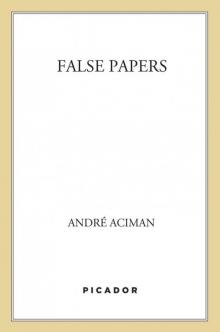 False Papers
False Papers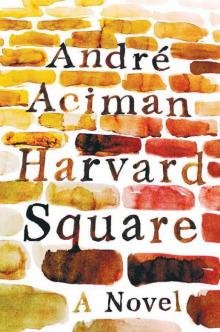 Harvard Square
Harvard Square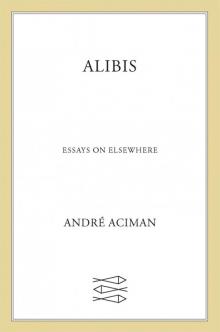 Alibis
Alibis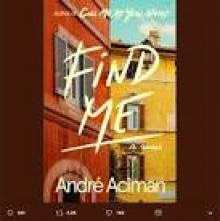 Find Me
Find Me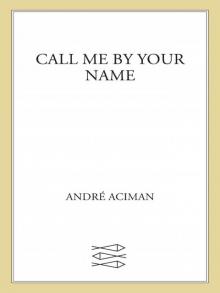 Call Me by Your Name
Call Me by Your Name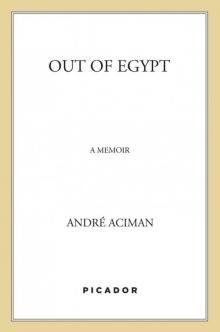 Out of Egypt: A Memoir
Out of Egypt: A Memoir Enigma Variations
Enigma Variations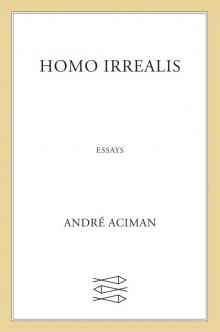 Homo Irrealis
Homo Irrealis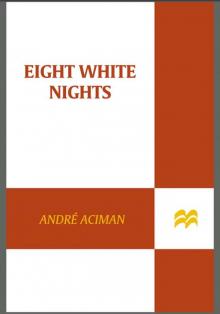 Eight White Nights
Eight White Nights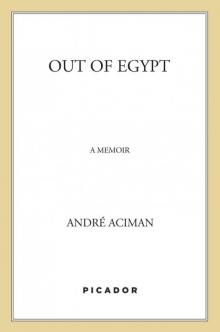 Out of Egypt
Out of Egypt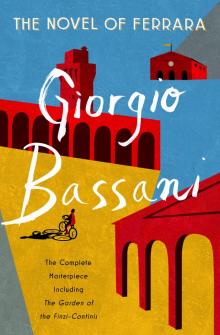 The Novel of Ferrara
The Novel of Ferrara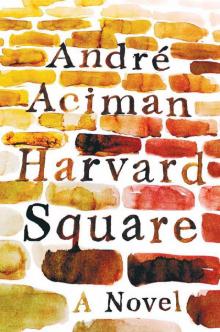 Harvard Square: A Novel
Harvard Square: A Novel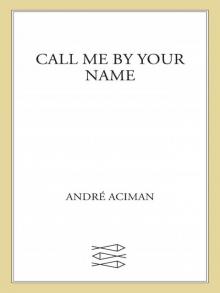 Call Me by Your Name: A Novel
Call Me by Your Name: A Novel